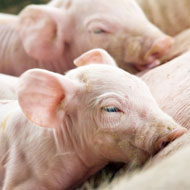Study sheds light on foetal development in humans and pigs

It is thought the differences observed after birth could arise early in development
Light sedation of pigs in early pregnancy could be linked with decreased foetal weight, according to a new study, which has important implications for human and veterinary medicine.
Scientists from the Roslin Institute have developed the first non-invasive method to monitor blood flow at multiple stages of pregnancy, offering fresh insights into pre-natal piglet growth.
There is often a great deal of variation in the birth weight of piglets, with many litters having a ‘runt’. It is thought the differences observed after birth could arise early in development, raising questions about the role of blood supply to foetuses during pregnancy.
The research team found that changes in foetal heart rate and umbilical blood flow were linked with the stage of pregnancy, in a similar way to humans.
Lead author Dr Claire Stenhouse said: “It is hoped, with further optimisation, it may be feasible to measure blood flow in the umbilical cord of growth-restricted piglets throughout pregnancy.
“This is also of great interest in humans, particularly in the context of use of sedatives during pregnancy and improving the understanding of intrauterine growth restriction.”



 The Greyhound Board of Great Britain has published new vaccination guidance, with all greyhounds registered from 1 January, 2027 required to have the L4 leptospirosis vaccination, rather than L2.
The Greyhound Board of Great Britain has published new vaccination guidance, with all greyhounds registered from 1 January, 2027 required to have the L4 leptospirosis vaccination, rather than L2.